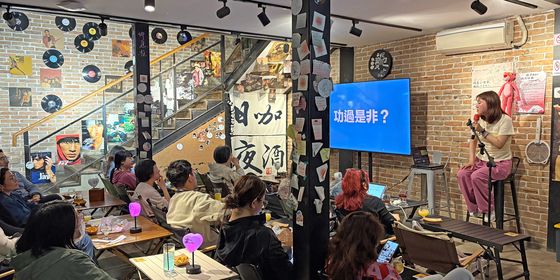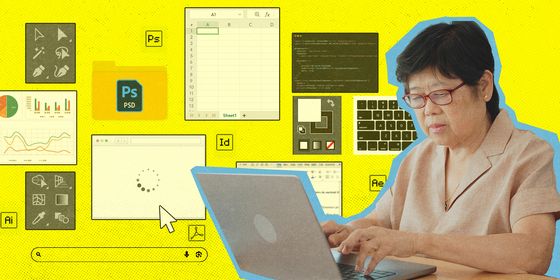With a rising tech sector and poor job prospects in their own fields, humanities grads are looking to join internet companies
“Not only would a sociology degree not have gotten me a good job, I would have been unable to find a girlfriend,” Richard Liu, CEO and founder of e-commerce platform JD.com, is quoted as saying. “I had to become an entrepreneur.”
Liu graduated in 1996, when the internet was in its infancy. In those days, it was still a bold choice to abandon a humanities degree—and the “iron rice bowl” job it often entailed—for the unpredictability of China’s Silicon Valley. Still, this was the era when Alibaba founder Jack Ma was starting his first company, after years of failing to make something of his English degree from Hangzhou Normal University.
Ma and Liu are now two of the richest men in the world. The empires they’ve built, moreover, have since lured a noticeable number of fellow humanities graduates towards the fast-paced world of Chinese tech. This February, the question “Why are there so many humanities students wanting to get into IT?”) was posted on China’s largest Q&A platform, Zhihu, and had received 1.88 million views and 462 replies at the time of writing.
The most obvious reason lies in the relatively low threshold for entry in internet startups, combined with high remuneration, ideal for humanities students who hope to find high-paying jobs but may lack the quantitative skills to work in finance or programming. Making a cutting-edge product requires continual innovation and management ability, where technical know-how matters less than the ability to generate ideas and learn—or at least, a willingness to work overtime.
In recent years, the popularity of one particular position is such that it has coined a phrase: “Everyone is a product manager” (人人都是产品经理). A 2010 book of the same name, which comprehensively explains all the minutiae of this job, is a staple recommendation for the bookshelves of humanities students considering the switch to tech. A WeChat public account of the same name also publishes several articles a day advising aspiring product managers.
“Most internet companies just ask you for your opinions on some app…[and] the material remuneration can be as high as those working in finance,” 27-year old Hu Rong tells TWOC, explaining her motivation for product management after majoring in Japanese at Peking University. Hu had previously worked as a Japanese-Chinese translator, and is currently studying for a Master’s degree in Teaching Chinese as a Second Language (TCSL).
“If I do product management at [a company like] Tik Tok, my entry-level salary could be as high as 300,000 RMB per year,” Hu reckons. “It’s triple what I would earn teaching foreigners Chinese.” Besides teaching, the other traditional career for those with Hu’s degree is translation, a notoriously underpaid work, usually performed by freelancers, with no social security benefits.
The salary, though, is not always the draw; even some graduates of more research-oriented science fields are feeling the siren song of tech companies. Wang Shichao, who graduated with a Master’s degree in geology, has joined Jinshanyun, an AI firm which offers perks like a housing subsidy and three meals per day in the company canteen.
“The life of a researcher is lonely and tiresome,” says Wang. While others with his degree have gone on to pursue a PhD, seen as the gateway to a stable job in academia, the process is often made arduous by a faulty peer-review system and a nigh-unbearable pressure to publish. “I like the relaxed environment of tech companies, everyone gets along really well with each other,” Wang observes.
Some humanities students feel their degrees are an asset to tech companies. Wu Wanqiu, a 25-year-old student in PKU’s TCSL Master’s program, has already interned at Baidu, Xiaomi, and Meitu. At Xiaomi, she worked alongside computer-science majors to optimize the Chinese listening and spoken skills of a Siri-like virtual assistant. “When we were working on the voice-recognition app,” Wu recalls. “The computer-science majors would consult me constantly on the pronunciation of certain words, subtext of certain expressions, and basically anything related to the Chinese language they weren’t sure about.”
Still, even Richard Liu had to learn programming in his spare time while studying for his sociology degree, and Wu is no different, learning to read and write basic code outside of work. At school, she audits classes on entrepreneurship and participated in an extracurricular project to build an AI wardrobe. As entry into tech becomes more competitive (after all, there are only so many product management positions available), students like Wu are trying to train themselves into the complete package of humanities insight and technical skill. “I’m interested in seeing how I can combine my degree with other fields unrelated to my degree,” Wu tells TWOC.
Then again, it may not be skills, or even field of study, that’s the ultimate arbiter of success. “Degree discrimination” remains rampant in China, with students at job fairs reporting preferential hiring from prestigious “Project 985” or “Project 211” universities (to say nothing of vocational school graduates, who may not get any job offers at all). All except one of top 20 schools that contribute new hires to China’s “big three” tech companies—Baidu, Alibaba, and Tencent—are part of Project 985, a recent study claimed.
Whatever the reason, as long as the offers keep rolling in, humanities graduates might find themselves compelled to leave their comfort zones as they prepare to compete for jobs—even if the underlying motivation is not a passion for tech, but fear of missing out. “Internet companies are really growing,” Hu says. “If I don’t follow the trend, I might get left behind.”












